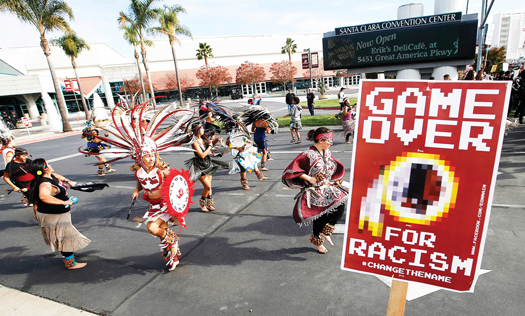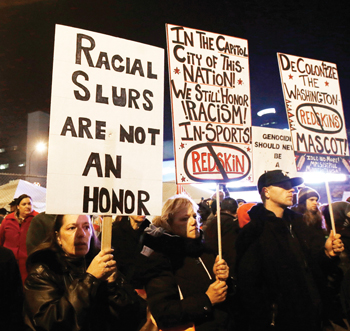Federal judge upholds revoked patent for racist NFL team name
By Askia Muhammad -Senior Editor- | Last updated: Jul 14, 2015 - 1:31:49 PMWhat's your opinion on this article?

A group protests the Washington Redskins name across from Levi’s Stadium before an NFL football game between the Redskins and the San Francisco 49ers in Santa Clara, Calif., Nov. 23, 2014. Photo: AP/Wide World photos
|
WASHINGTON (FinalCall.com) - After nearly one year in court, a federal judge drove yet another nail into the coffin of the Washington NFL team’s “patently offensive, disparaging and demeaning” name, which “perpetrates a centuries-old stereotype” on July 8, upholding the U.S. Patent and Trademark Office’s cancelation of six federal trademarks for the name “Washington Redskins,” rejecting it as a racially offensive trademark.
On June 18, 2014 after seven years of litigation, the Patent and Trademark board, by a 2-1 vote determined that the football team’s name is “disparaging to Native Americans” and thus in violation of federal trademark laws banning offensive or disparaging language.
In his 70-page opinion this year, Judge Gerald Bruce Lee wrote: “the evidence before the Court supports the legal conclusion that between 1967 and 1990, the Redskins Marks consisted of matter that ‘may disparage’ a substantial composite of Native Americans.”
The judge rejected the federal lawsuit filed by Pro-Football Inc., the company that owns the team, challenging the patent agency’s decision, as well as the constitutionality of the trademark law prohibiting trademarks that “disparage…persons, living or dead, institutions, beliefs, or national symbols.”
In denying the free-speech claim, Judge Lee cited the Supreme Court’s recent First Amendment ruling on specialty license plates. In June, the high court said Texas could reject a request for a license plate featuring the Confederate battle flag, concluding that license plate designs are “government speech” and fall outside of First Amendment protection.
“The federal trademark registration program is ‘government speech’ and is thus exempt from First Amendment scrutiny,” Judge Lee wrote. Indeed, the Washington team name “is the sports version of the Confederate flag,” sports columnist Dave Zirin said following the court decision on “The Collision,” his talk show on Washington radio station WPFW-FM.
“We anticipated the Supreme Court’s decision and structured our arguments anticipating the outcome” in the case,” Jesse Witten, lead attorney for Amanda Blackhorse and four other Native American litigants, told the Law Blog, according to a published report.

In this Nov. 7, 2013 file photo, American Indians and their supporters gather outside the Metrodome to protest the Washington Redskins’ name, prior to an NFL football game between the team and the Minnesota Vikings in Minneapolis. Based on testimony from linguistics and lexicography experts, and a review of how the term was used in dictionaries, books, newspapers, magazines and movies, the Trademark Trial and Appeal Board ruled 2-1 that the “Redskins” was disparaging to Native Americans on June 18, 2014. Photo: AP/Wide World photos
|
The Indians won a decision seven years later from the Trademark Board, which said the name could be interpreted as offensive to Native Americans. Trademark law prohibits registration of a name that “may disparage . . . persons, living or dead, or bring them into contempt, or disrepute.”
The term “redskins” actually refers to the Indian skins and body parts—including genitalia—that bounty hunters had to show in order to receive payment for killing Indians, Ms. Harjo told The Final Call at the time of the latest Patent Board victory in 2014. “To many Native Americans, the term ‘redskins’ is associated with the barbaric practice of scalping,” she said. After the latest victory when the trial judge upheld the trademark office decision, Ms. Harjo was “grinning so hard her teeth hurt,” Mr. Zirin said she told him in a telephone conversation.
Team president Bruce Allen said in a statement that he was surprised by the outcome in Judge Lee’s court, but determined to prevail on appeal. “We are convinced that we will win because the facts and the law are on the side of our franchise that has proudly used the name Redskins for more than 80 years,” Mr. Allen said.
But the tide against the offensive name has been swelling over the years. Former Hall of Fame Washington team members and other athletes have spoken out against the name, as has President Barack Obama. Dozens of members of the Senate and House of Representatives have also written letters urging team owner Daniel Snyder to change the racist name.
Former U.S. Sen. Ben “Nighthorse” Campbell, himself a Native American who was a Democrat turned Republican from Colorado, declared at an all-day symposium on the subject in 2014 that the four most offensive words ever spoken to him were: “savage,” “squaw,” “buck,” and of course “redskin.”
“We decide, based on the evidence properly before us, that these registrations must be cancelled because they were disparaging to Native Americans at the respective times they were registered,” the Trademark Trial and Appeal Board wrote in its opinion in 2014.
While the board’s decision eventually renders a blow to the team’s ability to exclusively market and sell paraphernalia using the offensive name, the current protection remains in effect while the team appeals the most recent decision against the name to a higher court.
If this ruling stands, then if anyone can print the name on sweatshirts or other apparel without the team’s permission, it would become more difficult to legally go after such groups. The ruling involves six uses of the “Redskins” name trademarked by the team from 1967 to 1990, causing the team to lose a significant portion of its ability to protect the financial interests connected to it.
The ruling from the Trademark Trial and Appeal Board came in a case that has been working its way through legal channels for more than two decades. In 1999 the Trademark Board issued a similar ruling in a case that was first filed in 1992. That decision was overturned in 2003 on a technicality that the plaintiffs waited too long after the name was trademarked in 1967 to complain. That case went to the Supreme Court in 2005 which declined to hear it, allowing a lower court ruling favoring the team to stand.
“The organizations and Indian tribes stand together to express with one voice their collective opinion on the fundamental fact underlying this case: the ‘Redskins’ trademark is disparaging to Native Americans and perpetuates a centuries-old stereotype of Native Americans as ‘blood-thirsty savages,’ ‘noble warriors,’ and an ethnic group ‘frozen in history,’” the National Congress of American Indians (NCAI) argued in its court papers brief before the Supreme Court announced its decision.
After Natives initially persuaded the Trademark Trial Appeal Board that the name was offensive and illegal in 1999, the team challenged the decision in court, arguing the legal doctrine known as “laches,” that the plaintiffs had waited too long before they legally challenged the name.
In 2003 a U.S. District Court ruled in favor of the team. An appeals court upheld that decision and the Supreme Court let that decision stand, without considering the merits of the challenge to the team name. The new case may now be headed back to the Supreme Court.
“We decide, based on the evidence properly before us, that these registrations must be cancelled because they were disparaging to Native Americans at the respective times they were registered,” the patent board wrote in its opinion last year.
“The Trademark Trial and Appeal Board agreed with our clients that the team’s name and trademarks disparage Native Americans. The Board ruled that the Trademark Office should never have registered these trademarks in the first place,” attorney Witten said at that time.
“We presented a wide variety of evidence—including dictionary definitions and other reference works, newspaper clippings, movie clips, scholarly articles, expert linguist testimony, and evidence of the historic opposition by Native American groups—to demonstrate that the word ‘redskin’ is an ethnic slur.”
The trademark office has implicitly recognized a shift in how “redskins” is viewed. From 1996 to 2002, it rebuffed the team at least three times when it tried to register new brands using the word. In each case, examiners cited disparagement as the grounds for action.
The team ownership and some of its fans however, insist they are “honoring” the bravery of Native Americans by imitating tribal dress and customs which for the most part they don’t understand. Dr. C. Richard King, co-editor of Encyclopedia of Native Americans in Sports, and a professor at Washington State University says those who believe that the name is an “honor” are simply holding on to a “sincere fiction.” The reality is that objectifying Native people with sports team names in Washington, Kansas City, Cleveland, and Atlanta, is ugly and offensive.
While the Washington team has used this offensive nickname for 80 years, the petitioners argued that the word redskins is a racial slur—like “chink,” or “wetback,” or “raghead,” or the “n-word”—and therefore shouldn’t be entitled to federal trademark protection. The team’s lawyers insist that the moniker is wholly well-intentioned, and an inoffensive honorific of sorts, rooted in pride and tradition.
INSIDE STORIES AND REVIEWS
-
-
About Harriett ... and the Negro Hollywood Road Show
By Rabiah Muhammad, Guest Columnist » Full Story -
Skepticism greets Jay-Z, NFL talk of inspiring change
By Bryan 18X Crawford and Richard B. Muhammad The Final Call Newspaper @TheFinalCall » Full Story -
The painful problem of Black girls and suicide
By Charlene Muhammad -National Correspondent- » Full Story -
Exploitation of Innocence - Report: Perceptions, policies hurting Black girls
By Charlene Muhammad -National Correspondent- » Full Story -
Big Ballin: Big ideas fuel a father’s Big Baller Brand and brash business sense
By Bryan Crawford -Contributing Writer- » Full Story






 Click Here Stay Connected!
Click Here Stay Connected!








